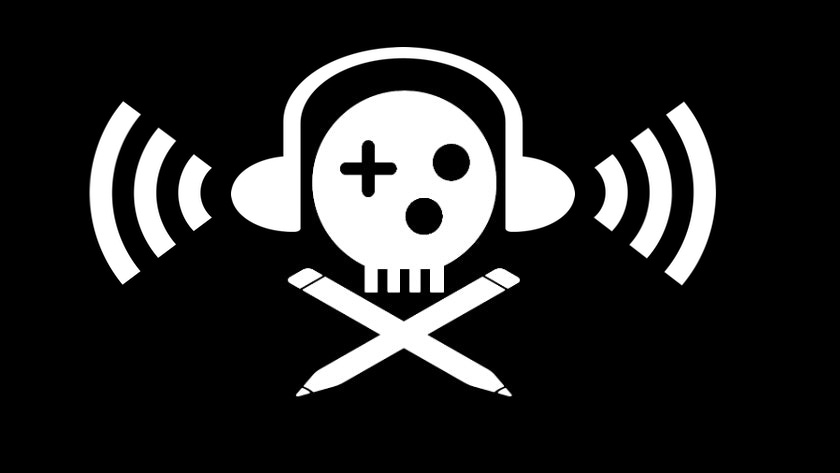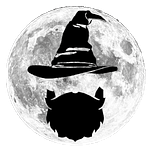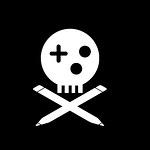Ahoy, me hearties!
This week, I present to you a bonus interview with Matt McLaine: gamer, pirate historian, and an indispensable source for this whole pirate series. So grab a cuppa grog, have a seat, kick up your peg leg, turn your parrot’s volume up, and enjoy!
Oh, before you do: in parts of the recording, you might hear my daughter milling around in the background (clearly, she wants to be a gaming writer/podcaster as well!). Apologies in advance if you find her chirps distracting. If you find them cute, however—and there’s no reason you shouldn’t—then I apologize for nothing.
Also, if you want a refresher before you listen, here’s the full series on pirates so far:
Part 1 ● Part 2 ● Part 3
References and transcript below the fold. See you next week!
~Jay
PS—As a reminder, Game & Word will now publish on Sundays instead of Mondays. If you have any thoughts on the change, feel free to let me know by replying to this email.
Podcast References
Books
A Merry Life, and a Short One: Unhelpful Self-Help and Terrible Advice from the Golden Age of Piracy by Matt McLaine
Piracy Papers: Primary Source Documents from the Golden Age of Piracy by Matt McLaine
At the Point of a Cutlass: The Pirate Capture, Bold Escape, and Lonely Exile of Philip Ashton by Gregory Fleming
Under the Black Flag by David Cordingly
Pirates in Their Own Words by Ed Fox
Villains of all Nations by Marcus Rediker
Games
TV Shows
Extras
Transcript
NOTE: This interview and its transcript have been edited for length1 and clarity.
Game & Word: Hello everyone! Thank you for joining us for this bonus edition of Game & Word, featuring gamer and pirate historian, Matt McLaine. Matt, do you want to say a few words?
Matt McLaine: Welcome aboard! I'm glad to be a part of Game & Word. This has been a fascinating journey. I can't wait to dive into pirate history, and how video games treat that history, and how they weave back and forth between them. This is going to be a great ride.
G&W: So, what's your verdict, generally speaking? What's your assessment on how good a job they do of that?
McLaine: In general, there's a lot of them that just slap a skull and crossbones on anything random and call it “piratey.” I mean, literally, if you give your character a pirate hat and a cutlass, Skyrim can be a pirate game, so to speak.
G&W: Right.
McLaine: If you're standing on a ship and you're holding a cutlass, well, close enough, right? There's the games that just put the appearance on it, just the facade of piracy, and there's ones that actually take their time to do some research.
Assassins Creed Black Flag? Obviously, they changed a lot of things; you have their mythology behind everything, but the names, the events, a lot of the interactions are a lot more realistic.
Then there are games like Sid Meier's Pirates!, which again, given that you have to play through game mechanics as a player, you have to make it fun, you have to make a game of it-
G&W: Yes.
McLaine: Games like that, that actually set out to be more historical, tend to, I think, do a surprisingly good job of it.
Sid Meier's Pirates! dates back to the 1980s. It was a Commodore 64 game, an Apple II game, and then they remade it in 2000, and again in 2012. So, it's just been going on and on, but it's essentially the same game under the hood. They haven't really changed the history of it, but they did a decent job getting most of it right.
Granted, [there are] things like you're in the Buccaneer Era hanging out with Henry Morgan, and then Bartholomew [“Black Bart'“] Roberts shows up—from 1720—in 1666. You're like, "Hmm," but, again...
G&W: Yeah. It's also like [that] in Civilization.
McLaine: Right. You can play historically, or you can go to Alpha Centauri in 1700.
G&W: Exactly.
McLaine: Given that game players are going to find a way around it, they're going to run out of content if [the developers] limit themselves to what only happened in 1715.
So there are the games that try and do a good job of it, historically, given what they have to work with. And there are games that just put the “look and feel” on it. Like Sea of Thieves, for instance, is just a free for all without bothering with much of the history behind it. It's giving you the environment and a sandbox to play in, but it's not trying to be historical.
G&W: Basically, it's giving you the archetype of the pirate, versus the reality of the pirate.
McLaine: Right.
G&W: If you do play Sea of Thieves, I'm always looking for crewmates!
McLaine: Everyone is, right?
G&W: Yeah. Specifically, ones that aren't a**holes.
McLaine: Yeah, knowing my life, I'm going to show up and they're all manatees.
G&W: A funny thing happened to me this morning, actually. I was on a sloop, open crew, and this guy joined me. He clearly out-leveled me by a factor of at least 10. So we all get set up, we get our provisions on the ship, we're en route, we decide on the voyage. And then, I'm just kind of wasting some time playing my hurdy-gurdy, and the stupid a**hole shoots me overboard. He just shoots me overboard!
McLaine: Yeah, that's Sea of Thieves for you. That's the whole game in a nutshell, right there.
G&W: I know you mentioned Sid Meier's Pirates! and we talked about Assassin's Creed, but ignoring the historical accuracy part, which pirate games do you personally enjoy the most?
McLaine: I get a lot of historical piracy in the things I do outside of gaming. Just research, and writing, and things like that, so when I'm gaming, it's like, "Yes, I've seen that before."
It's like, my wife teaches dance at the college level, so when she watches serious performances, that's one thing. But when she watches a random TV show that has a dance bit thrown in the middle, she just turns her head and says, "I can't watch it." She's like, "Nope. I can't look at that, because all I'm going to do is nitpick."
[Like me] sifting in through the history, I'm like, "Yeah, that's pretty cool. They actually got that right. They're pretty accurate there," but then, I find myself bogged down. I'm like, "Ah, no! No! That was a Bartholomew Sharp expedition, that wasn't Morgan! That was 1692, not 1688!" And then I’ve got to stop, and take a step back, and be like, "Okay, chill." It's Tropico 4: Pirate's Cove. It's not The General History of Pirates: The Game. We can just let it go.
But, if I'm looking to have pirates in a game, I have to make myself not be worried about historical accuracy. So, something like Risen II: which is a complete sword-and-sorcery fantasy world, but it takes place on ships and islands.
There's a lot of shipborne activity, and you can take the “pirate” route in your playthrough, and again, it hits the tropes, but without even trying to take itself too seriously.
G&W: Right.
McLaine: Games like Pillars of Eternity II: Deadfire, which is a fantastic role-playing game; if you like the old Baldur's Gate-style RPGs, that’s the next step. But again, takes place in a very coastal, islandy environment. And you can follow that route, and you can deal with those characters, and you can just sort of hang a hat on it and say, "Okay, this is as ‘pirate’ as it's going to get without having to worry about the history of it.”
Because if I want the history, I got a whole bookshelf over here that's packed with history, and I got a hard drive full of articles, and chapters, and things. So I'm like, "Sometimes I just need to step back from the pure realism."
G&W: Right.
McLaine: There's a link on my desktop right now for Pirate 101, which is a kid's game. And I was playing through Pirate 101 for a while, just as part of my Twitch series. And I'm like, "This is [an] absolute kids’ clickbait, ‘please pester mom and dad to pay some real money’ loot box.” But just to kill a mindless hour or two, hacking away at skeletons, wearing skull and cross bone tri-corner hats? …Okay! It's that or Cookie Clicker.
G&W: Pick your poison, right?
McLaine: Exactly.
G&W: Yeah. I feel you, man. My daughter pesters me, like... Yeah. As a fellow father, you have my solidarity.
McLaine: Yeah. My kid was playing Wizard 101 for a long time. This was years ago. They're over it now. They're playing Wizard 101 like, "Dad, there's a pirate version of this same game! It's called Pirate 101."
I'm like, "Eh, really?" But then, I'm like, "You know what? I'll check it out. I'll stream it a couple of times." I have a character in there that's level… whatever.
It wasn't one of those things that you can play like a father-daughter adventure together. It was just more like over dinner like, "Hey, I got up to level three and I found the golden coconut."
And they're like, "Really? I found that, too." And okay, we can bond over that, but it's not multiplayer enough for me to hang out with them and get a session going or something. It is what it is. It's just a time killer, so all good.
G&W: So, what got you interested in piracy? Just as a topic of scholarship, or inquiry?
McLaine: I’d ask the same question, but I'll go first, since you asked. Just years ago, I randomly read David Cordingly's Under the Black Flag. I just needed a book to pass some time. I don't know, walking through an airport or something. I just had to have something to read. I saw the skull and crossbones on the cover. I'm like, "That looks cool." I read it. It was really interesting.
And then, a few years ago, something just struck me like, "You know what? I'm going to reread that book. It was interesting back then. I think I remember it." I reread it and I'm like, "This is awesome." Something just clicked. I was hooked. I'm like, "I've got to learn about this."
And one thing about Corningly's book is, it is years old now. It was a few decades back now. It's been superseded. I think you say that in your blog, that there’s “newer and better” [pirate books].
But he mentions a lot of really obscure pirates. People who don't appear in anybody else's work or who only get mentioned in his book, and nowhere else, like he found some newspaper clipping from the 1700s and just said, "Oh, cool name," wrote that down. And no one else has a copy of it, because it's buried in a British archive somewhere.
And I'm like, "Okay, everybody knows about Blackbeard. Everybody knows about Stede Bonnet. And everybody knows about Bart Roberts. But who's this guy? Who is Joseph Farrow? Who is John Bear? Who are these guys?” And I went looking for info on some of the lesser-known names. There's nothing out there. Not in a quick Google search, anyway. The name comes up, but there's nothing immediately that jumps out that has a life story.
Like, there's [already] a monument to Stede Bonnet in downtown Charleston in South Carolina. Somebody in the pirate subreddit posted a picture of it saying, "We got to find this guy's remains!" Well, there aren't in any, but there's a monument!
Anyway, I started looking for these obscure pirates and there wasn't anything. I said, "You know what? I'm going to fix that." So, I picked the list of names. Just a few. And I said, "Okay, Thomas Wake, and John Farrow, and William Maze. I'm going to search what happened to these guys and find out, and I'm going to add them to Wikipedia, so that the next person to go looking for them, when they type in, 'Joseph Farrow Pirate,' it'll be the first link that comes up. And they'll have a quick bio of him, and links to the people he hung out with, if he had any influence or if he just died obscure, whatever."
And as soon as I did the first one, I'm like, "This is cool." And of course, when you find one, you find info on another, and then you're down the rabbit hole.
G&W: Right.
McLaine: And I started writing Wikipedia articles for pirates. And I ended up writing a whole lot of Wikipedia articles for pirates, almost all Golden Age, a few Buccaneers. And before I knew it, I had done so many of them. And again, I didn't do the big ones. Bart Roberts is already there. Blackbeard's already there.
I'm not going to touch Stede Bonnet's article because it's a mile long, it's a novel in itself. But, all these little guys? And it started fascinating me because I live in South Carolina, so a lot of these people came to the Carolinas. I'm like, "Hey, I've been to that place! That river that guy sailed into, I've been there. That plantation this guy visited when he got done pirating, I've been there. I've seen these things. I've walked where this guy walked," and I'm like, "I have all this information," and I started finding all these connections, local places people have heard of. And I'm like, "I got to do something with this."
So I started finding all this info on these obscure guys, and I started adding in the Wikipedia, and before you knew it, I had done like 100 or 150 Wikipedia articles on obscure pirates.
And when I have all this research on all this stuff I've compiled for, I'm like, "You know what, there's no excuse for not going further with this, turning it into an article, a book, a blog post." And rather than just sharing it through Wikipedia and hoping somebody stumbles across it, to actually go out there and start posting some of this stuff. And it just stuck with me. But I won't say it's an addiction. I keep the bookshelf under control!
G&W: What do you think it is about pirates, just as an archetype, that fascinates people so much?
McLaine: I think it's the same archetype, the same fascination you'd find with the Wild West. Or with Vikings. It's an adventure we can't live today. Things we can't do anymore. And things that, not that we couldn't do, but wouldn't do today.
You read a book by Marcus Rediker, like Villains of All Nations, it's a fantastic book. But he wants to paint pirates as kind of “Freedom Fighters,” fighting evil merchants, and taking down the East India Company, and establishing capitalism, and fighting for American freedom versus European domination.
That's great, but they're also pirates. They're thieves, they're robbers, they’re looters, they’re murderers, and worse. We're so far removed from it, that we can pull out the adventuresome aspects of it, and kind of separate ourselves from the more squeamish parts of it. The same way we could, again, with the Wild West, or 1930s mobsters, or something. We can put ourselves in those shoes and imagine the adventure of it without having to deal with the reality of it.
G&W: That brings me to this thing where it seems we live in a world where people can't hold more than one thought at the same time, and everything has to be “either/or.” And that's kind of like what I talked about, establishing my benchmark for judging a game on accuracies like “how well do they capture the dichotomy,” right?
McLaine: Right.
G&W: On the one hand: pirates are innovators. Very much social innovators with democracy, and equity, and whatnot… while also being brigands, and murderers, and torturers. I mean, they're not mutually exclusive, you know?
McLaine: Absolutely. When people bring up the “Freedom Fighter” aspect, I'm like, "Yes, but there's also this."
G&W: And it doesn't nullify it.
McLaine: Right! And at the same time, yes, they were also doing these things, like Blackbeard, his crew was two-thirds Black, for instance. Bart Robert's crew was like half-Black, or of African descent, or freed slaves, or American-Indian natives. But, at the same time, if they caught a ship full of slaves, they'd sell them.
G&W: Right.
McLaine: So, yes, they can fight for social justice, but at the same time, the motivation was not social justice. Not entirely. There are some guys out there who fight the man: "We are here to fight against base merchants and cruel masters of ships." That was William Fly, I think, said that. But, at the same time, when he gets on board the ship, he immediately puts an ax to the captain, shoots anybody who resisted. Okay… yeah.
So, just as long as we can keep both in mind. And again, like you said, a game like Black Flag does a good job bringing up the fact that yes, these guys were doing all these things to fight against oppression, and that there was a lot of corporate and government villainy, and a lot of complicity. At the same time, they were also thieves, and betrayers, and there was no honor among thieves.
They [Ubisoft] capture that web, that convolutedness of it. That really does, like you pointed out, make for a more realistic portrayal of at least the behind-the-scenes aspects of it.
G&W: And it's funny because it's even more stark if you play the game versus watch a Let’s Play, because—I didn't realize this at first, but it actually makes perfect sense—the player character, Edward Kenway, is apparently based on [Edward] “Ned” Low. And that actually makes a lot of sense because as the player character, you're doing a lot of hacking, and slashing, and-
McLaine: And very violent things.
G&W: Yeah, exactly. So, it puts you in the middle of it; you're perpetrating a lot of this villainy, while also fighting a different type of villainy.
McLaine: Yeah. And that's a lot of what made the Golden Age of Piracy attractive, as a genre. And, speaking of Ned Low…
If you meet a skilled sailor and you're short of sailors, you'll press them to serve you. They didn't like it when the British Navy did it, but the pirates would do it themselves. You don't have a carpenter, or a surgeon? You find a surgeon.
G&W: Yep. What was the name of that poor surgeon who was hiding out in The Bahamas?
McLaine: I don't remember the surgeon's name, but I remember he had a choice of being pressed into service with the French, or the English. And he hid there, and the Frenchman came and grabbed him at sword point until [Benjamin] Hornigold came up and said, "No, I'll protect you, but you're coming with me."
If you're going with somebody, you might as well go with people who speak your language! But, yeah, that did happen.
I believe it was Ned Low who didn't want to press into his service—and this is one of the most violent pirates out there—married men, men with a family.
And again, this guy is one of the most gorily violent pirates out there. Some of it maybe is very likely exaggerated to give him a bad name. We get that. But, enough witness accounts say that he was awful, that he's awful.
G&W: Right.
McLaine: It was [Richard] Shipton, and [Francis] Briggs, and the other guys who served with Low and later had captained ships of their own, who pressed Philip Ashton into service. And Ashton's story is one of the best pirate stories out there. It's real, it's authentic. There's a great book on Ashton's story called At the Point of a Cutlass by Gregory Fleming. It's a fantastic book. But Ashton's story, called Ashton's Memorial, is available for free online. If you haven't read it, it's quick, and it's an easy read.
G&W: Would you mind giving a quick little synopsis for our listeners?
McLaine: Sure. Ashton was a sailor. Again, we just talked about this: pirates, when they were short on crew? In the early days, the Buccaneer era, this wasn't a thing, but by the late Golden Age—the late 1720s especially—the days of 200 men crews were over. If you had 20 men in your sloop, you're done. So, Ashton's ship was captured. He had some skills.
These pirates said, "Okay, all the unmarried men step forward," and someone whispered to Ashton, "Hey, you seem like a nice guy. Tell him you're married. He won't take you." And Ashton’s like, "Why would I believe this pirate? This pirate's telling me to say, 'you're married.' I'm not married!" So, he told him, "I'm not married." And of course, had he said that [he was], they put the married men in a boat and shoved them off. Let them go.
So, he ended up pressed into their crew and served them. He tried to escape a couple of times. One time, he saved himself by diving in the cargo hold and hiding. And one time, another pirate he'd been nice to like protected him like, "Don't hurt that guy."
But, he got on their bad side. Would not sign their pirate articles. Didn't want to be associated with them. Just did everything he could to get away from them. And finally, they went to the Island of Roatan, which is off of Honduras.
And he requested to be part of the shore party. And someone said, "Yeah, yeah, sure, come on. We could use an extra hand gathering supplies," where they had to fill their water casks and things. And as soon as he got to the shore, he turned around and looked, and the other guys were off gathering fruits and things. He took off running into the bush.
And Roatan is... it's got a beach, and a jungle, and not much else. And they searched for him, and yelled after him, and threatened, and bribed, and he wouldn't come out. And finally, they just left him there.
So, he's trapped on this essentially deserted island alone, shoeless, no supplies, in the middle of a jungle. And he's there for like a year and a half. It's a Robinson Crusoe story, but it's real.
And it's very much like, if you know who Alexander Selkirk is, Selkirk was marooned on a Pacific island in one of the Buccaneer expeditions, and Selkirk stayed in the islands for almost a year and a half. And he was rescued by William Dampier, who recognized him, and Selkirk's story is widely thought to be the basis for Robinson Crusoe.
G&W: Hm.
McLaine: But, you also have this story that wasn't in the Pacific. It was right there in the Caribbean: [the story] of Philip Ashton. And Spaniards came to the island, too. And he hid from them, because the Spaniards would've put him in chains and taken him away. Even though that was a salvation for him, he had to watch his... well. And they knew he was there. They heard him and saw him. They couldn't find him. But he had to watch his salvation sail away, because he knew that could be even worse than being left alone.
And this long story, it's very Robinson Crusoe: making a shelter, finding things to eat, discovering what he could and couldn't eat, putting together a raft so he could paddle over to a neighboring island because the mosquitoes were so bad, they were eating him, literally eating him alive.
So, he had to find this little rock out in the middle of the Atlantic, to sit on because the breeze was strong enough. If the breeze hit shore, it just hit the jungle and stopped. It was dead air. But when out on this little rock, he could at least get some rest because the breeze would keep the mosquitoes off. And his feet got torn up because he had no shoes and the island is full of rocks and shells. It's this long survival epic.
Again, Ashton's Memorial, if you Google it, it's available online. It's just a few pages. A preacher he knew, wrote his story down when he came back to civilization.
This old trapper came to the island, met him there, and left him a rifle, a knife, and a canoe. And the trapper went off and disappeared, and he's never heard from again. So, the guy left his stuff here, didn't come back for it, so Ashton did the best he could, survived on it. And eventually, he met some bay men, logwood cutters, and they were a really rough bunch. But he said, "You know what? I can't stay here any longer." Got in with them. Eventually made his way back to civilization.
And the scary part is, the same pirates who marooned him there, came back to the island! They came back to Roatan a couple of times looking for him, because they knew they could get food and water there. So, he would see a sail coming, like, "A sail! I'm rescued," and then, "Oh my God, it's Francis Briggs! It's the same guy. It's Richard Shipton! It's the same guy who's ship I just jumped out of and swam away from."
So, Ashton's story again, is a fantastic one. It makes for a good read. Even if you don't buy Fleming's book, read Ashton's Memorial, the short version. Again, online, it's free. And it's just a great survival story. And it's a great background on these pirates.
Again, doubling back on a long conversation, even some of the cruelest guys like Edward [Ned] Lowe… we talked about this, that whole dichotomy.
In a lot of role-playing games, I've heard the main character described as a “murder hobo.” [Going] place to place, slaughtering everyone in their way, but somehow, supposedly freeing the country, saving the kingdom, defeating the evil wizard, whatever. And in Black Flag, yes, you're doing that. Literally, you're wiping out pirates and raiders left and right. At the same time, you're trying to complete this whole long, convoluted, time travel quest.
G&W: Right.
McLaine: So, yeah, it really is a good depiction of kind of the duality that's going on there, between trying to accomplish something good in the long term, but going about it in the guise of a murder hobo.
G&W: At the end of the day, “do the ends justify the means,” right?
McLaine: Right. And obviously to them, yeah. It's like [the] Jacobite pirates, there's been a lot of good literature written [on them] in the last few years. A lot of them named their ships Jacobite names: the Royal Rover, the-
G&W: Queen Anne's Revenge.
McLaine: The Queen Anne's Revenge, the Royal James. They would drink Toast to the Old Pretender. Charles Vane and his crew drank Toast to the Old Pretender, Damnation to King George. But, a lot of it was just on the surface. They would spout the slogans, name their ship, but you didn't see any of them sailing back to France to join James III, to raise an army, to go put him back on the throne of England.
They're using these slogans, and the phrases, and the tropes, but it's really just on the surface. And a lot of that whole, like, "We're going to fight the man, fight the power," was a lot of talk… but in reality, they're not Robin Hood. When they say “we're going to rob to the rich and give to the poor,” the only poor they're giving to is themselves.
G&W: So, the other stuff's kind of more to ease their conscience, then?
McLaine: Right. Some of it is just to give themselves of a veneer of respectability like, "Oh, we're fighting for James III, the Old Pretender," or, "We're fighting to avenge poor sailors against cruel merchants." And some of it was, like you said, just to ease their own conscience like, "We're not really robbers, we're doing this for a cause!"
And some of it, I think, was recruiting tactic, "Hey, we're not just robbers. We've got something good going on here!” And some of it was just sloganeering like, "If we're captured, we can say we were really doing it for this purpose," or just to give themselves a sense of unity like, "We're going to say we have this uniting cause to bring us all together, because we all hate the East India Company," or, "We all got the shaft because the merchant owed us two years worth of back wages, and never paid us, so we're going to hold a mutiny."
And in reality, of course, they just wanted to loot ships until they could retire.
G&W: When it comes to engaging people in history more generally, I would love to hear your thoughts on video games as a possible pedagogical tool. Because I know more than a few people who were inspired to become historians from playing Civilization back in the day. And I'm sure that Assassin's Creed's also grooming a whole new generation of such folks. What do you feel are some of the advantages and maybe some of the pitfalls of using video games to get people interested in history?
McLaine: I think we touched on it a little bit, and you've talked about it in your blog post a couple of times, that there's the realism aspect of it. How the game is going to communicate fact and history, but they have to manipulate it to make it a game.
They have to, whether it's just pure game mechanics or whether it's altering the setting, like Sid Meier's Pirates!—great game, but you're encountering figures from the 1720s while you're sitting in 1666, or something. So, they're altering the historical aspects of it, to turn it into a game.
And that can, I think, lead people astray a little bit. Until they get enough into it, to do their own research, obviously. And mistaking some of the game mechanics for like, "Oh, pirates did this because..."
Like, why did pirates use cutlasses? Why did they load their cannons with explosive shells? Okay… they didn't use explosive shells. They did use a lot of different kinds of shells, but not those. Did pirates use grenades? Yes, they used grenades, but maybe not in the same way that our game character would have.
And can one game character change the whole game universe? Arguably, someone like Henry Every, or Bartholomew Roberts, or Henry Morgan, had that influence on other people and made a big change in the world. But, it's very different than what they have to let your character in the game do. And I think it can easily lead people astray.
The History Channel, for instance, put out some games. They put out Vikings, and they put out Great Battles of Rome. They put out The Civil War, Battles of the Pacific, et cetera. Legends of War: Patton. They put out a series of these games. None of them were highly regarded as games, because to be a game, you have to be game enough to bring people in and keep them interested. You can't just have accurate history, without having enough entertainment in it to get people hooked.
Which is why a series like Black Sails did well. And they have a lot of historical elements. They're like the live-action version of Black Flag. They name-dropped so many historical pirates, and recreated so many historical incidents—the sinking of the Treasure Fleet, and Hornigold establishing the “Republic of Pirates” in Nassau, and Vane being deposed for Calico Jack—but with enough alterations and dramatizations to make a series out of it.
G&W: Right.
McLaine: And you also have the main character based on, essentially, Long John Silver. Like having Edward Kenway meeting all these historical figures. Inserting somebody from out outside of history, so that they can either take part in events, or influence events, or at least meet all these event makers, in a way that keeps it entertaining.
What's the other series that came out alongside Black Sails? Crossbones. Crossbones came out around the same time and was panned, and didn't come back for four seasons like Black Sails, because it just wasn't good. And I never watched it. I've seen just the trailers, and a couple episodes, but I didn't binge-watch or anything. And again, it got that wrong.
You have to be good enough [at] entertaining to pull this off, to bring people in. And with luck—like Black Sails, like Black Flag—you've done enough of the history work on the side, that people start asking, "Okay, who was Benjamin Hornigold? This Edward Teach [Blackbeard], putting lighted matches in his beard, did that actually happen?" If you get people asking those sorts of questions, you've done your job on the history side—while still being entertaining, staying popular, and making enough money that you can keep this going.
And it's a hard balance, and there've been so many failures of games out there. And there are some that, like Sea of Thieves, [are] for people who already like pirates, not for people who have any interest in pirate history, because that's out the window.
Whereas a game like Sid Meier's Pirates!, you can get into it if you like pirates, but [also], if you know the names and you see Henry Morgan on the cover, you're like, "I know that guy! And not just from rum!" So, you can bring in both crowds.
G&W: Just to kind of wrap up, if you want to plug your pluggables, now's the time to do so.
McLaine: Sure! I am thrilled to have been a part of, and helped out on Game & Word. I did write a bunch of Wikipedia articles. They're buried under a different username, but if you look up the obscure half of Golden Age pirates on Wikipedia, that's probably me.
If you want to read about them under my name though, look up Matt McLaine. I'm on Amazon. In 2019, I wrote A Merry Life and a Short One: Unhelpful Self-Help and Terrible Advice from the Golden Age of Pirates. A pirate self-help book in which I go over actual pirate history and facts, but pull out some helpful tidbits from them, and awful advice that pirates would give you if they weren't trying to press you into service.
And then, in 2020, I came out with a book called Piracy Papers: Primary Source Documents from the Golden Age of Piracy.
Piracy Papers was an homage to one of my favorite pirate books, called Pirates in Their Own Words by Ed Fox, which collected a lot of first-person accounts, historical documents, unpublished manuscripts, [and] compiled them in book form, so that people looking for, literally, “pirates in their own words,” could see beyond just what's in books like The General History of Pirates, and see what the pirates actually said for themselves, and see what people said about them, from the time period.
If you think General History was based on newspaper accounts at the time, you can go back in books like Pirates in Their Own Words, or in Piracy Papers, and actually read those newspaper accounts. You can read the sermons preached at pirate funerals. You can read accounts of pirate interactions with famous figures like Isaac Newton and Ben Franklin. And really get a sense of what different aspects were like, both from the sides of the pirates themselves, from their victims and survivors, from the colonial officials that had to deal with them. And that inspired me again, to make Piracy Papers.
And I've got a couple more in the works. You can find Piracy Papers and A Merry Life and A Short One on Amazon right now, paperback and Kindle versions. I'm going to have a book, Heaven willing, I will have a book on the not-pirate Thomas Green, coming out later this year. Green is famous, or infamous, for contributing to the union of Scotland and England that became Great Britain.
Inadvertently, of course, because he was dead, and it was his death that contributed to it. He was no way, whatsoever, a pirate, but he was accused and executed of piracy. And his death helped inspire the active union that caused the formation of Great Britain. So, it's a great backstory and it's a lot of original period documents surrounding Thomas Green, his trial, his life, and the events that led up to his really unfortunate demise.
And you know, thrilling stories of Scottish judges, who didn't want to find him innocent, because they feared for their lives. One minister's carriage was overturned on the street by an angry pitchfork-wielding mob who demanded that he find this guy guilty and he is like, "…Okay."
And just the backroom maneuvering by the people who wanted the active union to go forward, and were afraid things like this would derail it.
And then, hopefully, don't know if I can manage it this year, but I'm going to try, to get a book out about some of the pirates who influenced the Carolinas, which is my home. Everybody knows about Blackbeard. Everybody knows about Stede Bonnet, the “gentleman pirate.” Blackbeard blockaded Charleston. Stede Bonnet made his escape from jail in Charleston.
But, there were so many other pirates who influenced so many things in the Carolinas. Pirates who retired and bought an entire island off our coast. Pirates who sailed up a river that I grew up fishing when I was young. I never knew that the mouth of that river had a pirate sitting in it!
And when I say, "Oh, we're going to fish the sandbar," that there's a pirate who escaped a bigger ship by sitting across that sandbar because the pirate had a ship with a shallow draft, and knew he could make it and the other ship couldn't.
And the place we go every year to pick out a pumpkin from the pumpkin patch is a plantation whose owner was kicked out of the governor's council because he was found guilty of conspiring with pirates, because that's how he made his money. It wasn't off his plantation work. It was off the gray market, smuggling with the pirates!
And little stories like that just weaved throughout the Carolinas. And the more I dug, the more I found them. And Blackbeard's fascinating, but his influence was limited to holding Charleston hostage for a couple of days, once.
But, there were so many pirates who had more influence, whose names we don't know. And those are the guys—again, coming from a history of starting writing by being fascinated by the obscure pirates—those are the stories I really want to tell. And hopefully, I can get to that this year. If not, who knows? It'll come.
G&W: Ladies, gentlemen, and non-binary folks: Matt McLaine. Thank you so much for your time.
McLaine: Thank you for having me. Best of luck with Game & Word. I wish you the best, because it's some fascinating stuff.
Yes, really.
















Bonus: The Greatest Pirate Stories Never Told, featuring Matt McLaine